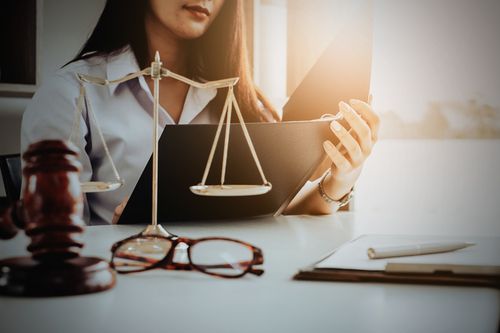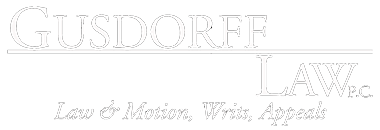If your trial was unsuccessful, appealing could provide you with some relief. And if your trial succeeded, the other side may likely challenge the outcome. No matter the case, you will need appellate lawyer either way.
Appealing a civil case is often a time-sensitive and complex process. In many cases, the stakes are high, with things a large verdict being on the line. In short, if a case is worth appealing, then it’s worth hiring the right Long Beach appellate litigation attorney. This should ideally be someone who can maximize your chances of success.
Gusdorff Law provides appellate services in Long Beach and all around California. Get in touch with us today to talk to an experienced lawyer today.
What Is Appellate Law?
Appellate law is a court process that occurs in higher levels beyond the trial court. The process of asking the higher courts to evaluate and review all or parts of the decisions made by a lower court is referred to as an appeal. The attorneys who handle these kinds of cases are known as appellate lawyers. Appellate law happens both at the state and the federal level, as well as in criminal and civil law.
When the trial court renders an unfavorable ruling, the appellate court could review the substantive or procedural issues of the law that one side thinks may have produced a different outcome if they were considered. The appellate court does this by reading the record of the lower court, including the full transcript of the hearing, the motions, evidence exhibits, orders, and other relevant documents to the case.
The appellate court will then decide to either reverse the decision, lower the court’s decision, or remand the issue back to court. Either party may represent themselves or choose to be represented by a lawyer. The party that files the appeal is generally referred to as the appellant, and the party to whom the appeal is filed is referred to as the respondent.
How Is an Appellate Lawyer Different From a Trial Lawyer?
Trial lawyers usually handle all matters that happen at the first level of the judicial system. They are the ones you work with when facing a criminal or civil matter. A trial lawyer does the initial investigation and manages all of the pre-trial matters, including the discovery process as well as the court hearing prior to the case. Trial lawyers also negotiate with the defendant to try to reach a settlement, or otherwise take your case to trial. Once the court reaches a final judgement, the work of a trial attorney ends.
Appellate lawyers step in when the trial attorney’s case is unsuccessful. An appellate hearing is largely different from trial hearing. No new evidence can be presented, no arguments can be made to a jury, and no witness testimony can be presented. An appellate hearing usually consists of presenting written briefs along with oral arguments to an appellate judge panel based on the processes and procedures followed at the lower court.
The main purpose of an appeal is to present evidence supporting the fact that an error occurred during the original trial or in a significant fact that fundamentally changed the outcome of the case. Your appellate lawyer will assess the trial transcript, including evidence, pre-trial motions, witness testimony, and the judicial rulings to establish where mistakes were made.
What Can Be Appealed?
Generally speaking, as a party involved in a civil matter – including a product liability lawsuit, a premises liability case or a personal injury lawsuit – you can appeal any final verdict or judgment. However, for you to appeal, you must submit your appeal within the set time limits, and there must be some legal ground for filing your appeal.
Legal grounds for filing an appeal in California are errors of law or procedure that occurred at the trial level. For example, the judge may have made an incorrect ruling on an objection or motion, which allowed biased testimony to be heard by the jury.
What Functions of the Appellate Process Does Gusdorff Law Handle?
The appellate process is demanding, complex, and strict time limits apply. The appellate process requires some of the most sophisticated legal reasoning performed by a lawyer. As experienced appellate firm, Gusdorff Law is prepared to analyze your case, assemble all required documents, and help with all aspects of your appeal including:
Briefs
In order to present your case to the appellate court, your attorney will research and write an appellate brief. This will be your real chance of fully explaining to the appellate court why your case should be considered and reversed. If your argument isn’t included in the brief, then it generally can’t get considered.
Writ of Petition
A writ of petition is a formal order usually issued by the court of appeals, ideally ordering a lower court or an administrative body to either cease doing something or do something. It’s quite similar to an appeal but it usually argues on issues that cannot be argued in direct appeals. All in all, writs are a powerful tool that can be used to have the court order a new trial, further proceedings in a lower court, immediate release of a defendant, among other outcomes.
Oral Arguments
Appeals don’t entirely take place on paper. Your lawyer might be allowed to orally defend your case in court, and ideally present your position and best interest to the higher court. The hearings are typically short, which is why you should avoid reiterating facts that were already stated in the briefs. Your lawyer should instead spend more time explaining the most important parts of the brief and responding to any questions that may arise.
Petition for Review
When the appellate court makes an announcement, you and your lawyer could submit a request to a higher court for the case to be reviewed. The motion has to be acted upon soon after the decision made by the appeals court. You don’t need to get a petition for rehearing in order to submit a petition for review. However, it will be needed when you want to challenge the declaration of the appellate court and any issues in the appeal.
Motions
A motion is an application made to the court requesting that the court make a decision on a certain issue. Some pre-trial motions include:
- Motion to change venue
- Motion to suppress
- Motion to dismiss
There are several post-trial motions that can be filed when the case is over, including a motion for a new trial or a motion to set aside a verdict.
Trial and Appellate Mediation Briefing and Representation
The mediation process at the court of appeals is a confidential and informal process where the parties appealing work with an impartial mediator, who is selected and trained by the court, to help in reaching an amicable resolution.
Opposition to Motions for Summary Judgement
If you won your case and the other side filed an appeal, we can help file a motion for summary of judgement asserting that the defendant has raised no genuine issue for an appeal and ask the appellate judges to rule in your favor. If you are requesting an appeal, we can oppose motions for summary judgement.
What Types of Appeals Does Gusdorff Law Handle?
Gusdorf Law offers representation on different civil appeals throughout California, including in Long Beach. Some of the appellate cases we handle include:
Personal Injury
Personal injury cases that aren’t successfully negotiated before going to trial usually proceed to the state trial courts, where a jury verdict on the plaintiff determines the amount of compensation they receive for the injuries caused by the defendant. If your personal injury case was unsuccessful or you weren’t satisfied by the verdict, you can appeal the jury’s or court’s decision.
Product Liability
If you had a product liability case handled in a state court, and you weren’t successful in obtaining compensation for your damages, you have the option to appeal to the Supreme Court or the Court of Appeals. If the case was handled in a federal district court, you should apply to the appropriate circuit court.
Premises Liability
In many cases, premises liability cases focus on establishing when property owners and tenants are responsible for the injuries suffered in a property. Unfortunately, some premises liability cases are unsuccessful, even when the facts are seemingly in your support. Fortunately, you can appeal the court or jury’s decision by filing an appeal in a higher court with the help of an appellate lawyer.
Probate
When a probate court issues an order in your litigation, you have the right to appeal the decision in a higher court. However, you should note that the decision as to whether to appeal the decision of a probate court should be based on a solid understanding of the appeal process in California. An appellate lawyer can guide you through the probate appeals process and handle the details of the case on your behalf.
Real Estate
We also offer representation to clients in appeals of real estate cases. We know that real estate disputes are some of the most challenging cases, and we provide aggressive representation for clients looking to appeal cases involving property and real estate rights.
Contact a Long Beach Appellate Litigation Lawyer Today
Wether you want to appeal or the defendant is appealing against you, we can help. At Gusdorff Law, we specifically handle appeal cases, and can consult with you about your case for free. Note that appeals are very time-sensitive, and you should consult with a lawyer as soon as possible after the trial court judgement is made.
Also note that if the decision from the appellate court is still not favorable, you have the option to appeal it to the California Supreme Court. Whatever the case, we can help. Talk to us today at 818-877-4515 to learn more about your legal options from a local Long Beach appellate litigation attorney.




